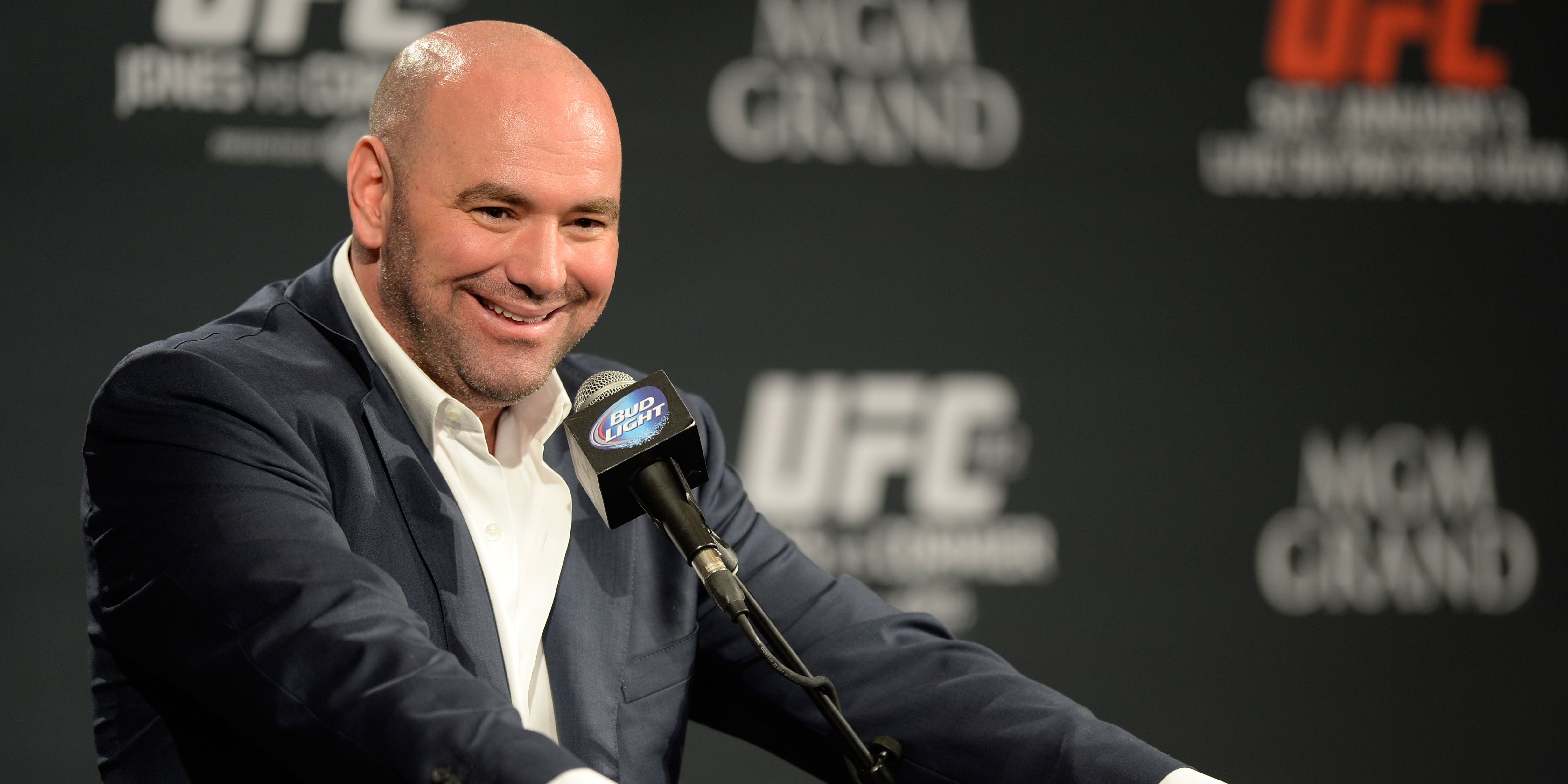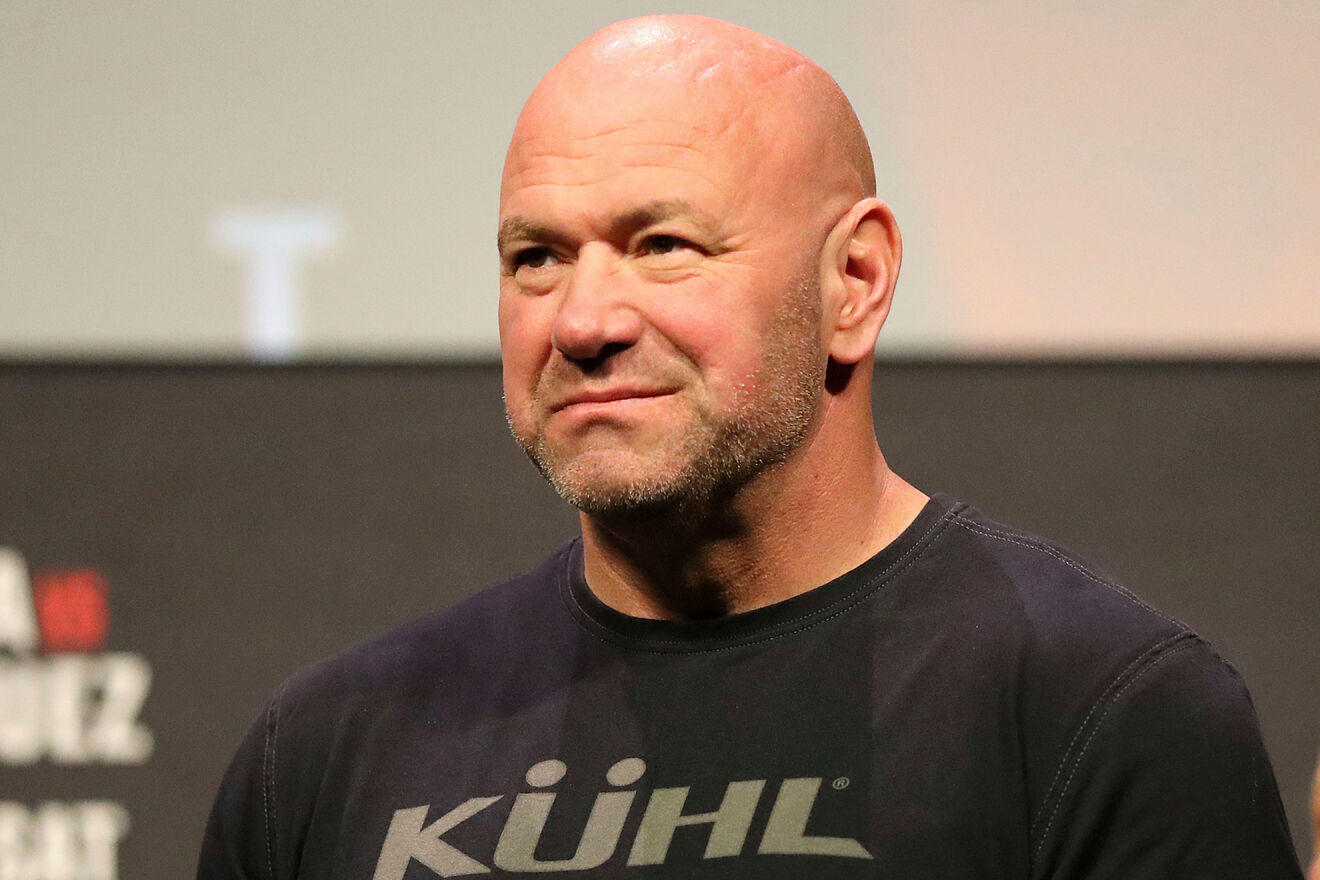Dana White's Net Worth - Unpacking The Fortune
Have you ever stopped to consider the sheer amount of money someone like Dana White has accumulated over the years? It's pretty wild, you know, to think about how much wealth one person can gather, especially when they're at the helm of a massive sports enterprise. People often talk about his influence in the world of combat sports, but what about the financial side of things? That, is that something we truly grasp?
His story, actually, is more than just about fighting; it’s a compelling tale of business savvy, bold moves, and, well, a whole lot of cash. For many, Dana White's name is practically synonymous with the Ultimate Fighting Championship, or UFC, which he helped transform from a niche spectacle into a global powerhouse. You see him everywhere, practically, from press conferences to behind-the-scenes footage, always seeming to be in the thick of it all, and it's almost natural to wonder just how much that kind of dedication pays off.
This discussion will pull back the curtain a little bit on the financial picture of one of sports entertainment's most recognizable figures. We will look at how his financial standing has changed, what contributes to his impressive personal wealth, and, you know, just what makes up Dana White's net worth. It’s a fascinating journey, to be honest, from his early days to becoming a true titan in the sports world, and his finances tell a big part of that tale.
Table of Contents
- Who is Dana White - A Quick Look at His Story
- How Did Dana White's Net Worth Grow So Big?
- What Are the Main Sources of Dana White's Net Worth?
- A Look at Dana White's Net Worth Over the Years
- Does Dana White's Net Worth Reflect His Influence?
- What Are Some Common Misconceptions About Dana White's Net Worth?
- The Business Acumen Behind Dana White's Net Worth
- What's Next for Dana White's Net Worth and His Career?
Who is Dana White - A Quick Look at His Story
Before we get into the numbers, it helps to know a little about the person himself. Dana Frederick White Jr. isn't someone who just appeared out of nowhere with a huge sum of money. His beginnings were, you know, pretty humble, and his path to becoming a household name in sports was anything but straightforward. He grew up in various places, including Las Vegas and Boston, and, well, he had a connection to boxing from a relatively young age. He even spent some time working as a boxercise instructor and managing a couple of fighters back in the day.
It was through this connection to the fight world that he crossed paths with Lorenzo and Frank Fertitta, who were, basically, casino moguls with a lot of resources. This meeting, you know, turned out to be a really big deal for everyone involved. White, apparently, saw something special in the struggling mixed martial arts organization called the Ultimate Fighting Championship. He believed it had a lot of potential, even though it was, you know, kind of floundering at the time and even facing bans in some places. He brought his vision to the Fertitta brothers, and together, they decided to take a chance on it.
In 2001, they purchased the UFC for a sum that, looking back, seems incredibly small given what it became: just two million dollars. Dana White was appointed as the president, and that's where his remarkable run really began. He wasn't just a figurehead; he was, pretty much, the face and the voice of the organization, pushing it forward with a relentless drive. His early days at the helm were, you know, definitely filled with challenges, trying to convince people that this sport was legitimate and worth watching. But his persistence, along with the Fertittas' backing, started to change things.
He had this knack for promotion, a very straightforward way of speaking, and a clear vision for what the UFC could be. He was, honestly, willing to take risks and make tough decisions, which, in a way, helped shape the company into the global phenomenon it is today. His journey is a testament to, you know, really believing in something and putting in the incredible amount of effort needed to make it a reality, and that, too, is a big part of why we're talking about Dana White's net worth.
Personal Details and Bio Data of Dana White
| Full Name | Dana Frederick White Jr. |
| Born | July 28, 1969 |
| Nationality | American |
| Occupation | President of the Ultimate Fighting Championship (UFC) |
| Known For | Leading the UFC's rise to global prominence |
| Spouse | Anne White |
| Children | 3 (sons Dana III, Aidan, and daughter Savannah) |
How Did Dana White's Net Worth Grow So Big?
The story of Dana White's net worth is, you know, really intertwined with the meteoric rise of the UFC itself. When he and the Fertitta brothers first bought the organization, it was in a pretty rough spot. They were losing money, actually, quite a bit of it, for several years. It was a huge gamble, and for a while, it looked like it might not pay off. They invested a lot of their own money, millions upon millions, to keep it afloat, to build a roster of fighters, and to market the sport to a wider audience. This period of significant financial commitment, you know, really laid the groundwork for future success.
A turning point, in some respects, came with the introduction of "The Ultimate Fighter," a reality television show that premiered in 2005. This show, pretty much, put the UFC on the map for a lot of people who had never heard of mixed martial arts before. It showcased the personalities of the fighters, the intensity of the training, and the drama of competition. It was, honestly, a brilliant marketing move that brought in a whole new wave of fans. From that moment on, the popularity of the UFC started to snowball, attracting more viewers, bigger sponsors, and, consequently, more revenue.
As the UFC grew, so did its value, and, you know, the personal financial standing of its key figures, including Dana White. The pay-per-view model became a massive source of income, with major events drawing millions of buys. The company secured lucrative television deals, expanded into international markets, and, basically, became a global sports entertainment giant. This growth wasn't just accidental; it was the result of consistent effort, smart business decisions, and, you know, Dana White's very public and often controversial presence, which kept the UFC in the news and on people's minds.
Then came the truly monumental moment in 2016. The UFC was sold to a group led by Endeavor, a powerful talent and media agency, for an astonishing sum: over four billion dollars. This was, arguably, one of the biggest deals in sports history. While Dana White remained as president, this sale meant a significant financial windfall for him, as he owned a percentage of the company. It’s pretty clear, you know, that this transaction had a huge impact on Dana White's net worth, pushing it into a completely different league. He continued to be the public face and the driving force, but his financial security was, well, more than cemented.
What Are the Main Sources of Dana White's Net Worth?
When we look at what makes up Dana White's net worth, there are a few key areas that stand out. His primary source of income, as you might expect, comes directly from his role as the president of the UFC. He receives a salary for this position, which, you know, is likely quite substantial given the size and profitability of the organization. This salary alone would make most people very comfortable, but it's really just one piece of the bigger picture, to be honest.
A much more significant portion of his personal wealth comes from his equity in the UFC. Before the 2016 sale, he held a percentage of the company. When the organization was sold for billions, his share translated into a massive payout. Even after the sale, he retained a smaller ownership stake, meaning he still benefits financially from the company's continued success and growth. This kind of ownership interest, you know, is often where the real money is made for people in his position, far beyond just a yearly paycheck.
Beyond his direct involvement with the UFC, Dana White has, you know, also ventured into other areas that contribute to his financial standing. He's a very public figure, so he sometimes gets involved in endorsements or media appearances. While these might not be as large as his UFC earnings, they certainly add to his overall financial health. He also has, you know, various investments, like many people with significant wealth, which can grow over time. So, it's a combination of his leadership role, his ownership in a hugely successful business, and other opportunities that collectively build Dana White's net worth.
A Look at Dana White's Net Worth Over the Years
Tracing the progression of Dana White's net worth is, in a way, like watching a slow burn turn into a wildfire. In the early 2000s, when the UFC was struggling, his personal finances were, well, probably not what they are today. He was investing heavily, taking risks, and working incredibly hard to keep the dream alive. There were periods, you know, where the company was losing tens of millions of dollars, which would have put a strain on anyone involved, even those with outside resources. So, at that point, his net worth would have been, you know, relatively modest compared to later figures, perhaps even negative if you count the investment losses.
The turning point, as we discussed, came around 2005 with the success of "The Ultimate Fighter" and the increasing popularity of the sport. From then on, the value of the UFC started to climb steadily, and with it, Dana White's ownership stake became more and more valuable. By the time the company was sold in 2016, his financial situation had, you know, definitely changed dramatically. That sale was the moment that really solidified his position as one of the wealthiest figures in sports. It was, basically, a huge jump, transforming his finances almost overnight.
Since the sale, his net worth has continued to be very substantial. While the exact figures are often estimates, financial publications often place him in the hundreds of millions of dollars, sometimes even higher. This continued high level is due to his ongoing salary, any remaining equity in the UFC, and, you know, the returns from his various investments. So, it’s been a gradual build-up, followed by a massive leap, and then a sustained period of considerable wealth, which, you know, really paints a picture of the journey of Dana White's net worth.
Does Dana White's Net Worth Reflect His Influence?
It's interesting to consider whether Dana White's net worth truly mirrors the immense influence he holds in the world of combat sports. On one hand, you know, his financial standing certainly provides him with a lot of power and freedom to make decisions, to shape the direction of the UFC, and to pursue new ventures. Someone with that kind of money can, basically, take bigger risks and invest in things that others might not be able to. So, in that sense, yes, his wealth definitely gives him a strong position to wield his influence, you know, quite effectively.
However, his influence also comes from something beyond just money. It stems from his personality, his willingness to speak his mind, and his deep understanding of the fight business. He’s been the public face of the UFC for so long that he’s become, you know, almost synonymous with the sport itself for many fans. His opinions carry weight, and his decisions, frankly, can impact the careers of hundreds of fighters and the livelihoods of many more people in the industry. So, while his money certainly helps, his influence is also a product of his reputation, his strategic vision, and his long history of leading the sport. You could say, in a way, his net worth is a consequence of his influence, as much as it is a tool for it.
What Are Some Common Misconceptions About Dana White's Net Worth?
When someone is as prominent as Dana White, especially in an industry that generates so much excitement and discussion, there are bound to be some misunderstandings about their financial situation. One common misconception, for example, might be that his entire fortune comes solely from his salary as UFC president. While that salary is, you know, definitely a significant amount, it’s the ownership stake and the eventual sale of the company that truly made his net worth what it is today. Many people might not realize the scale of that 2016 transaction and how much it added to his personal coffers.
Another thing people sometimes get wrong is, you know, assuming he has complete and total control over every financial decision within the UFC. While he is the president and a very powerful figure, the company is owned by Endeavor, a publicly traded entity. This means there are, basically, other stakeholders and a board of directors who also have a say in the bigger financial picture. His role, while extensive, operates within that larger corporate structure. So, while he has a lot of say, it’s not just him calling every single financial shot, which, you know, sometimes gets overlooked when people talk about Dana White's net worth.
There's also the idea that, you know, he simply "got lucky." While timing and opportunity certainly play a part in any major success story, Dana White's journey was also filled with years of hard work, significant financial risk, and a relentless drive to succeed. The UFC was losing money for a long time before it became profitable, and it took a lot of strategic thinking and, well, sheer grit to turn it around. So, attributing his wealth purely to chance, you know, misses the long and difficult road he traveled to get there. His financial standing is, basically, a result of persistent effort and smart business moves.
The Business Acumen Behind Dana White's Net Worth
It’s pretty clear that Dana White possesses a very sharp business sense, and this is a major factor behind the growth of Dana White's net worth. He wasn't just a fan of fighting; he had a vision for how to make mixed martial arts a mainstream sport. He understood the importance of creating stars, building rivalries, and putting on truly entertaining events. His ability to identify charismatic fighters and promote them effectively, you know, was a key part of the UFC's appeal. He knew how to generate excitement and get people talking, even if it meant being a bit outspoken himself.
He also showed a remarkable ability to adapt. When the UFC faced regulatory hurdles or public skepticism, he worked to legitimize the sport, pushing for stricter rules and better safety measures. He embraced reality television, as we mentioned, which was a huge gamble at the time but paid off immensely. He also understood the power of global expansion, taking the UFC to different countries and building a worldwide fanbase. These strategic decisions, you know, really helped transform a struggling organization into a multi-billion dollar enterprise, and his financial standing grew right along with it. His approach was, honestly, often unconventional, but it proved to be very effective in building a massive brand and, well, his own personal fortune.
What's Next for Dana White's Net Worth and His Career?
Looking ahead, it's interesting to consider what the future holds for Dana White's net worth and his ongoing career. He remains very much at the forefront of the UFC, continuing to be its public face and a key decision-maker. While the company is now part of a larger entity, his role seems secure, and his passion for combat sports, you know, appears undiminished. As long as the UFC continues to grow and generate significant revenue, his financial position will, basically, remain very strong.
Beyond the UFC, he has also shown an interest in other ventures. For example, he launched the Power Slap League, a new combat sports promotion focused on slap fighting. While it’s a much smaller endeavor compared to the UFC, it shows his continued drive to innovate and create new forms of entertainment. Any success with these new projects could, you know, potentially add to Dana White's net worth, though perhaps not on the same scale as the UFC. His legacy in sports is already well-established, but it seems he's still got plenty of energy to pursue new challenges, and those challenges could, in a way, further shape his financial picture.
So, we've taken a look at Dana White's journey, from his early days managing fighters to becoming the very recognizable president of the UFC. We explored how his sharp business instincts, combined with the strategic growth of the Ultimate Fighting Championship, played a massive role in shaping his considerable personal wealth. We touched on the significant impact of the UFC's sale in 2016, which, you know, truly solidified his financial standing, and considered the various income streams that contribute to his overall fortune. It's clear that his story is one of big risks, big rewards, and a relentless pursuit of making mixed martial arts a global phenomenon, all of which, you know, directly ties into the impressive figure of Dana White's net worth.

Dana White Net Worth - Net Worth Post

Dana White Net Worth: Career, Endorsements, Charity Work, and Personel Life

Dana White's Net Worth (2024) Including Career Earnings & UFC Salary